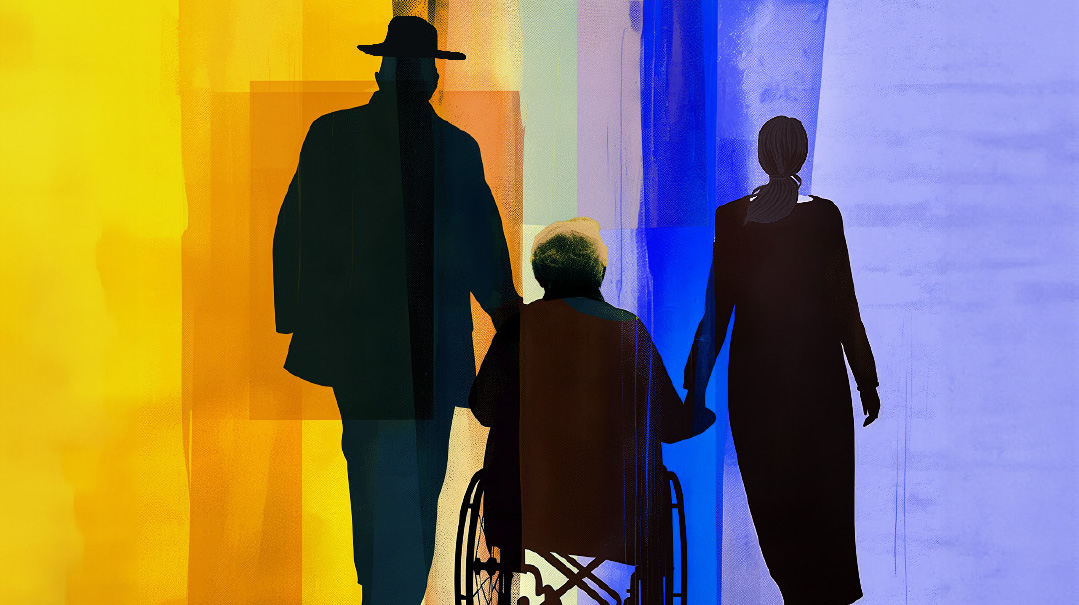Of Two Minds
| May 21, 2024Our Savta has looked forward to this day since, well, forever. She may be blissfully ignorant, but should she miss the opportunity to be at a family simchah?

Yonah
Painful as it is, at this point, it’s in Savta’s best interests to stay home.
Kayla
Savta is the queen of our family. Of course she needs to be at my wedding.
Kayla
Two sheva brachos outfits, one set of linen, an in-store housewares order scheduled for delivery in the next few days, and a pair of casual summer shoes, because you can never really have enough shoes.
Also because when you’re kallah shopping, the credit card bills mount up like crazy anyway, so another hundred dollars here and there barely seems to register.
We piled our bags in the trunk, got into the car, and I watched as Ma pulled out her notebook, checking things off her endless lists with a satisfied expression on her face.
“Good, good, we’re getting there,” she said.
I smiled, leaning back into the leather seat and closing my eyes for a moment. If Ma wanted to deal with the lists, that was fine with me; I just wanted to relax.
Being a kallah was fun. And exciting. And exhausting. But for good reasons.
I kept my eyes closed as Ma finally began driving home. Sunlight played games of light and shadow against my eyelids. We slowed for a red light and I opened my eyes.
“Hey,” I said. “We’re right near Savta. Maybe we should stop and say hi.”
Ma glanced at me. “You sure, honey? Aren’t you too tired?”
I was tired, but Savta was… Savta. And, I realized with a pang, it had been a while since I visited. What with working full time, plus shopping, plus kallah classes and wedding planning and everything else, life had just become very, very busy, very fast.
“Let’s just go in for a few minutes. I don’t know when else I’ll have time this week, anyway.”
A few minutes later, we were entering the Golden Age nursing home, saying hi to the receptionist and heading for Savta’s room.
My grandmother was sitting in her rocking chair, looking regal in a colorful headscarf and matching sweater. But her eyes were vacant, and even though she had a Tehillim in her hand, it was closed, and her hand rested limply in her lap.
“Hi, Savta, how are you?” I bent down to give her a kiss. “We came by for a visit.”
Savta smiled. She loved family, loved socializing; that hadn’t changed, even when everything else had.
“Kayla, darling, you look beautiful. A real kallah meidel.”
I exchanged a glance with my mother. Did Savta remember that I was a kallah?
“Yes, Ima, the chasunah is in less than three weeks now, we’re really excited,” Ma said.
Savta’s face wrinkled just a little more, and then she said, “Oh, Kayla, you’re getting married? You should have told me! Maybe you did tell me, and I forgot? I don’t remember so well these days….”
I bit my lip. Savta had been the first to hear the news of my engagement, and I’d brought my chassan to meet her even before the news was official. And of course, she’d been at the vort.
“Yes, it’s very exciting, and look, Savta, you even have a picture up here of me and my chassan,” I said, pointing out the engagement picture I’d tacked up on her bulletin board.
Savta gives a drowsy smile. “Yes, yes, very nice. Beautiful news. So there’s a wedding coming up, lovely. I’ll have to get a nice dress.”
“Don’t worry, Ima, we’ll take care of everything,” my mother said. We both knew that Savta’s simchah dress was all ready, dry-cleaned and pressed in her closet.
“Right. You’re going to look beautiful,” I added.
My heart broke just a little visiting Savta.
Anyone who didn’t know her before wouldn’t have understood, but this was just not who she was.
Just a few years ago, she was the family matriarch, hosting and cooking and shopping and running around, busy with her family and her friends and the weekly shiur she loved to attend.
And then — almost without warning — everything changed.
She suffered a stroke and never really recovered. Things went downhill, her health, her physical capabilities, her cognition.
At first, she’d been determined to stay at home, and honestly, that’s what we all wanted for her, too. But eventually, her condition deteriorated to the point where moving into a nursing home became the only sustainable option.
And the fact that independent, indomitable Savta didn’t fight was the biggest sign of how much things had really changed.
Of course, we were determined to be there for her all the way. The staff cared for her physical and medical needs, but the entire family rallied around to try to ensure that not a day went by when she didn’t have visitors. Her room was full of her own personal effects, some of her favorite pieces of furniture, and of course, dozens and dozens of photos. And my mother and her siblings were super involved in her care.
Some of the grandchildren, I knew, weren’t so comfortable visiting Savta. It was a little frightening to see our strong-willed, sharp grandmother, reduced to a shadow of her former self. But even though it was painful to see, I always pushed myself to visit, to become comfortable in the nursing home, as if it were Savta’s own home. I wanted her to have the satisfaction of hosting again, of having family come to visit — even if all she could offer us was a package of store-bought cookies or a drink.
Before I’d gotten engaged, I’d made a point of visiting a few times a week, and when I could, I’d take her out, sometimes to the park, sometimes to a quiet store. I wanted to give her a sense of normalcy, independence, a taste of the “real world” again. And I was genuinely close with Savta. On her good days, we had conversations, and there were flashes of the old Savta — quick retorts, sharp comments, pithy advice.
She’d always been very outspoken about my shidduchim.
“You know why you’re not married yet? Because none of the boys are good enough for you,” she’d say, laughingly.
“Nu, nu, you don’t need to worry so much — the right one at the right time,” was another favorite.
From anyone else, it would have been both patronizing and offensive, but I knew that Savta really believed it. She had that calm, wise perspective that comes from looking back at a long, satisfying life and knowing what really mattered.
“You’ll get married, Kayla, you’ll see. And he will be just wonderful. Worth the wait. Worthy of you.”
As time went on, those conversations became rarer, because Savta’s mind just wasn’t there anymore. On the days when she seemed to be struggling to remember the names of her grandchildren, I’d chat to her about the weather, the store, light conversation that meant nothing and everything. On the good days, I leaned in eagerly, extending my visit and just enjoying having the old Savta back, if only for a short time.
Savta had always been a voice of confidence for me, cheering me as I stumbled through school in the shadows of my popular, talented older sisters — and more recently, through my years in shidduchim.
“We’ll dance together at your wedding,” she’d promise me over and over.
When I got engaged, the first person I thought of was Savta. Of course she’d been at the vort, we’d made sure of that, and she was treated like the guest of honor. It wasn’t one of her better days, which was a shame, because she’d been disoriented and a little distressed when she couldn’t remember people’s names or where she was.
But she was there, in person. We had nice pictures together, and hopefully, the wedding itself would go better.
It had to.
The big day was just a few days off when Ma and I stopped in at Savta’s again. From the first minute, when Savta mixed me up with my sister Sara, I knew it wasn’t a good day.
“Ima, this is Kayla, remember?” Ma said.
“Kayla? Of course. Kayla. How are you doing? Such a pretty kallah meidel. You just need to find the right one.”
My heart sank. She didn’t remember.
“Ima, Kayla’s engaged. The chasunah is this week, remember?”
Savta’s face lit up, but her eyes were still pools of confusion. “Really? That’s so lovely. Why don’t I remember? I must have heard about it….”
It hurt me to see Savta so confused, and so pained that she was confused.
“Look, Savta, here’s the picture of Aharon and me, at the vort. And here’s another picture, together with you. You were there, and you’ll come to the wedding, and you’re going to look beautiful.”
Savta smiled. “Of course, of course I’m coming. I just hope I have a nice dress.”
As we left, my mother took a quick look back, and said to me in a low voice, “I hope Savta is okay at the wedding. You know how she can get in unfamiliar places. The world is so scary for her these days.”
“Right, but there’s no way she’s missing it,” I said. “I take her out a lot, and it’s really just a matter of having the right people around her, reassuring her. It’ll mean so much to her to be there.”
And then there were just 24 hours to go, and I came downstairs to hear Ma on the phone, saying something about me.
“I know, I know… but it’s so important to Kayla….” She was quiet for a moment. “Uh-huh. I hear that. I really do. Okay, Yonah, I need to go. Let me think about it and we’ll speak later.”
Yonah? My uncle?
Ma’s expression was sober when I came into the room.
“Kayla,” she said tentatively, “I was just talking to Uncle Yonah. He… he’s not so sure it’s a good idea for Savta to come to the wedding. He says she won’t remember it afterward in any case, and chances are she’ll get very distressed and confused there. It’ll be hard for her to be at a family simchah and be so helpless and overwhelmed. He thinks we should rather spare her the whole thing and let her stay in the home. She has no idea it’s tomorrow, and she’ll never know the difference.”
“What? But that’s — that’s so—” I grappled to find the right words. “Of course Savta has to be there. She’s the grandmother. She’s spoken about this for years, she wants to be there, she’ll appreciate it at the time, and then we’ll always have the pictures to show her afterward — how can we just pretend it’s not happening? What, and then next week, when she sees me in a sheitel and asks me about the wedding, I lie and pretend she came?”
Ma shook her head sadly. “I agree with you in theory, Kayla. I didn’t dream I’d make a chasunah without my mother there — and with her right around the corner! But practically, both Yonah and Shmuel don’t think it’s a good idea, and Basya says she hears our point, but she can’t promise to be available to help out with Savta all evening. You know she has to take care of Bruchelle….”
My mother’s only sister, Basya, had an older daughter with special needs. She’d have her hands full at the wedding, that was for sure. And if my uncles were refusing to arrange for people to be there with Savta the whole evening… it was going to be very hard to make it happen.
“The fact is,” Ma continued, resigned, “Savta would end up on the sidelines most of the time with the aide. And it’ll be noisy, she might get confused or upset, and Yonah thinks it’s not worth the risk.”
“But I don’t get it,” I said. “There are plenty of teenage girls among the cousins. If each one takes an hour to stay with Savta and the aide, it would work out fine. All it would take is a little bit of effort, and Savta would get the nachas and special experience that she deserves. How many simchahs does she get to attend?”
And how many more will she have the opportunity to attend? I didn’t say it, but the words hung in the air.
My mother sighed. “I agree with you, Kayla, but my brothers don’t. They think it’ll be needlessly painful for Savta, and she won’t remember it the next day, anyway. According to them, it’s just making her feel bad for no reason.”
No reason?
This was my wedding.
Savta had been my rock of support for years and years.
She’d promised me she’d be there.
She’d promised herself she’d be there.
Who knows, maybe this was the reason she pulled through her crisis, the reason she still had the energy to keep facing another day? The knowledge that she still had worth, a family, simchahs to attend? That she was still celebrated, still wanted, still needed as the queen of our family?
I called Yonah myself. I spoke to him for a solid half hour, the day before my chasunah, trying to explain how close I was to Savta, how much it would mean to both of us to have her attend. But it was like talking to a wall.
“It’s not good for her to have that upheaval for nothing,” he kept saying.
The night passed, the morning dawned, and the day I’d waited for so long was suddenly here.
I davened a long, heartfelt Shacharis. The makeup artist arrived, then the hairdresser. My dress was ready, magnificent in its white satin splendor.
Everything sparkled brightly under the chandeliers in the wedding hall. My ring. The beading on my gown. The tear that landed softly on the pages of my Tehillim.
It was glorious, perfect, surreal — but Savta wasn’t there.
And she could’ve been.
I thought of all those years, the promises I’d clung to. We’ll dance together at your wedding someday.
She could have been here, the center of attention, resplendent and regal. She could have posed for a picture with me, could have watched me walk down to the chuppah, could have shepped nachas and been brought to the center of the circle for the dance we’d been awaiting so long.
But because of my uncles’ insistence, she was left in the dark, in the nursing home, alone, ignorant of the milestone event taking place just a few blocks away.
If I could tell my uncles one thing, it would be: How can you take this simchah away from Savta when she’s been waiting for so long?
We were lucky, really.
You know all the stories, siblings struggling to share the burden of caring for elderly parents. There’s always the one who’s doing more and resenting it, the one who’s too overwhelmed with his own personal struggles, the one who wishes to be involved but is too far away, and the one who has no money to contribute but doles out lots of advice.
It’s not like that in our family. We’re four siblings, we all live fairly close by, and while things have been rough since Ima had her stroke and became dependent on assistance for her daily living, were grateful that we’ve all been pretty much on the same page.
We tried the aide route first, with Ima living at home while we took turns running errands and handling insurance stuff and doctors’ appointments. When it became too complicated, we agreed on the nursing home option and worked together to arrange all the technical details.
Over time, we’ve figured out a rhythm of sorts: who takes care of the legal issues, insurance and documents and paperwork; who coordinates the visits; who takes care of shopping and the little gifts for the nurses and whatnot; who brings Ima to family events….
The social stuff is more my sisters’ thing, they’re very into making Ima a part of things, having her attend every family party and whatever. Shmuel and I, the men of the family, deal more with the practical end of stuff, but overall we have a good system going.
They do theirs, we do ours, and there’s goodwill all around.
It was Chanukah time when I first realized that Ima’s condition was really deteriorating.
We had a Chanukah party every year. It was almost sacrosanct; a mesorah from our parents’ home. Of course, in the past, it was always Ima hosting, preparing, setting up and cooking and buying little prizes for the grandchildren. These days, we took turns hosting, but we made sure it happened, year in and year out.
And of course, Ima had to come, too. This was the highlight of her Chanukah, her nachas, whatever you wanted to call it.
Only this year, I wasn’t so sure it would be.
“Maybe it’s too much for Ima?” I wondered aloud to my sister Shana, who would be hosting the party.
“Aww, Yonah, you know Ima loves these things,” she said. “And Kayla will pick her up and bring her, we’ll make sure she’s okay. How can we have a party without her?”
I wasn’t so sure Ima would still love it. Noise and crowds overwhelmed her these days, and she didn’t always remember who everyone in the family was. Maybe it would just be painful for her, seeing a lively party go on around her and not being able to really join in?
But most of the family seemed to think things would be fine. My own daughter, Miri, who was younger than her cousin Kayla but close friends with her regardless, offered to be on duty together with her. “We’ll take care of Savta, Ta, don’t worry. Of course she needs to be there.”
I wasn’t sure about it, but they were, so I shrugged and let things be.
Ima talked about the party for weeks in advance — except when she seemed cloudy and confused. And those days were happening more and more often. But on her good days, she was full of excitement, Basya helped her to pick out presents for the kids, and she kept asking when she would get to fry her famous latkes for everyone.
“Ima, you work too hard, I’ll make the latkes this year,” Shana told her diplomatically.
And then the big day arrived. Shana made a beautiful party; there were tables full of finger food laid out buffet-style, lots of colorful Chanukah decorations on the wall, and a full program prepared by some of the cousins, including a game show, a bingo game, and a dreidel spin-off competition, whose rules I couldn’t quite follow, but seemed to be keeping the younger generation avidly entertained.
Everyone was enjoying it… everyone, that is, except for Ima.
It had started off okay, Kayla and Miri bringing her inside, helping her get settled in a place of honor at the head of the table. But as the evening wore on, the overstimulation seemed to be getting too much for her.
“Where are my latkes, who prepared the party?” she kept asking.
It was clear to me that this party — at which she was clearly a guest on the sidelines despite her seat at the head of the table — was painful for her, a stark reminder of the contrast between her life now and how things used to be.
We tried, we really did. We sang her favorite Chanukah songs and took turns sitting beside her to schmooze while the program went on. But Ima wasn’t stupid; she could see that the party was in full swing, that she couldn’t really be a part of it. She was painfully aware that in the space of a few short years, she’d gone from being the hostess, the giver, the party planner, and queen of the family, to the one watching from the side, unable to contribute everything she used to do so masterfully.
When the party ended, Ima looked morose, and when I visited her the next day, she still seemed out of sorts.
It took a few days for her to get back to herself after the break in routine. And the nursing home staff also said they thought the outing had been a bit much for her.
Not without a twinge of sadness, I wondered if it was time to cut down on Ima’s attendance at big, loud family events. It was physically overwhelming and emotionally draining for her. And with her memory starting to fail her, chances are she wouldn’t remember much of them either way.
Then my niece Kayla got engaged.
It was a big simchah, Kayla had been in shidduchim for a few years. She was the same age as my Leah’le, who already had two children.
Kayla had always been close to my mother, her grandmother. And in recent years, she’d stepped up to the plate a lot, visiting, taking her places, schmoozing with the nurses, going in on long Shabbos afternoons to keep Ima company.
Of course, Ima would be coming to the vort. It wasn’t a question. Kayla desperately wanted her there, we all did.
My wife, Malky, and I offered to bring her, and we left early to help Ima prepare and get to the hall on time. Ima looked beautiful, even if we had to remind her, as we left, where we were going.
“Of course! Kayla’s vort. It’s so beautiful. She waited so long, such a special girl. She needed the right one. Someone worthy of her.”
I smiled, because it was just like Ima to say that. She was a mama bear, fiercely protective of her offspring, even now.
We met up with the rest of the family at the hall. It was lively and busy; Kayla was popular, we had plenty of family, and the chassan came from a large family as well. I headed over to the men’s side, but Malky stuck with Ima.
“Don’t worry, I’ll get one of the girls to take a shift soon,” she’d reassured me.
At the family pictures, Ima was all smiles, beaming as she posed with Kayla, with Kayla and her chassan, and took her place in the center of a group shot. She was still looking happy when women started trickling and wished her mazel tov.
Everything seemed to be going well — until someone called me over to the mechitzah, where Malky was waiting for me, looking frantic.
“Yonah! Listen, Ima’s — something’s wrong, she got upset all of a sudden. I think she’s confused, she wants to go home. I left her with Leah’le and Miri, but she’s very agitated, I think we need to take her back already. It’s late and this is too overwhelming for her….”
I glanced through the partition to where my mother was sitting. She was twisting her head from side to side in a panicky motion. I could only imagine what she must feel like, helpless and confused in a busy, unfamiliar place.
My daughters were leaning over her trying to placate her, but it wasn’t clear if she remembered who they were, either.
“You’re right,” I agreed. “We need to take her home.”
Malky and I said our goodbyes and got Ima her coat. Outside the hall, Ima seemed calmer. We said something about the simchah, but she clearly just wanted to go back to her own room, somewhere familiar and quiet, where she could get some sleep.
We stayed with Ima for a while, helping her readjust to her own surroundings and making sure she was taken care of for the night. The experience had put a bit of a damper on the simchah for us, but that wasn’t the real issue. The main thing was Ima herself. I felt bad, like we shouldn’t have done this to her.
“Tomorrow, she won’t remember it,” Malky said when we were finally driving home.
“I know. And that’s why we shouldn’t have done it.” If Ima wouldn’t remember it anyway, why did we have to put her through it? So that Kayla could have a nice picture with her? Shouldn’t Ima’s needs come first?
“I don’t think Ima should go to that wedding,” I said.
Malky was quiet. I wasn’t sure she agreed, but she didn’t argue, either.
I knew Kayla wouldn’t be happy. I knew that my sisters would push back over this. But I also knew that this time, I was going to stand my ground.
A week before the chasunah, my sister Basya sent me a text. We need to figure out arrangements for Kayla’s wedding next week.
I hesitated before responding. I was sure of my position, but I wanted to word this right. I don’t think it’s a good idea for Ima to come, actually, I replied.
Basya’s answer came quickly.
????
She’ll never know the diff. It would be a disaster, you know how she is now unfortunately.
This time Basya took her time responding. Are you sure? she finally wrote back. Kayla is so close with her. And Shana would want her there.
I thought back to Chanukah, to the vort, to the time a few weeks ago when we’d hosted Ima for Shabbos. I’d thought it would be a nice break from the nursing home for her. Instead, she’d become so distressed upon waking up in a strange room that I felt like we had just made things worse.
I’m sure. We have to do what’s best for her, I replied.
If I could tell Kayla one thing, it would be: At this point, attending the simchah would cause Savta more pain than joy.
(Originally featured in Mishpacha, Issue 1012)
Oops! We could not locate your form.







